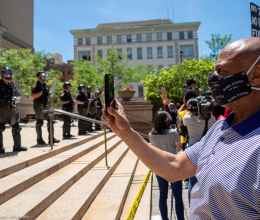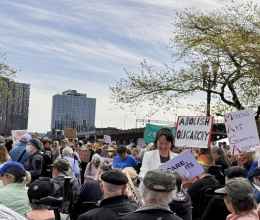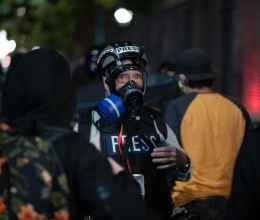
PORTLAND, Ore. — Today, the ACLU of Oregon filed a ballot title challenge to PDX24OL-03, an initiative petition filed by William Aitchison, the lawyer for the Portland Police Association (PPA). The challenge was filed in Multnomah County Circuit Court on behalf of Reverend Dr. LeRoy Haynes, Jr., the chair of the Albina Ministerial Alliance Coalition for Justice and Police Reform. The Portland police union is one of Oregon’s most powerful interest groups, which has continuously and aggressively attempted to undermine commonsense accountability measures for Portland police officers. Today’s legal filing asks the court to ensure that the ballot title for the police union’s petition will accurately inform voters that the petition would gut the independent oversight and disciplinary powers of the Community Board for Police Accountability established by 82% of Portland voters in 2020. (More information about this petition is in these FAQs.)
“This is both a moral and legal fight for the African-American community, communities of color, and progressive people who desire to have both justice and public safety. The Albina Ministerial Alliance Coalition for Justice and Police Reform has been working toward a vision of independent, community-led police accountability and oversight since Portland police killed Kendra James in 2003. It is a deep moral injury to be at the moment of being ready to implement that vision just to have the police union try to bring a counterfeit proposal to replace it. I hope that this ballot title challenge lays bare exactly what the police union is doing here — undermining community and accountability,” says Reverend Doctor LeRoy Haynes, Jr., petitioner of the title challenge to PDX24OL-03 and Chair of the Albina Ministerial Alliance Coalition.
With PDX24OL-03, the police union is trying to roll back the independent, civilian-led Community Board for Police Accountability overwhelmingly established by Ballot Measure 26-217 — by revoking the essential authority and resources the board needs to function. An effective police oversight board requires independent civilian leadership, sufficient funding, authority to conduct investigations into officers, direct access to police files, the power to subpoena records, noninterference by other agencies and the ability to discipline officers. Voters and the City of Portland provided these authorities and resources to the Community Board for Police Accountability. But PDX24OL-03 guts these essential accountability elements for effective community police oversight. The police union’s initiative deprives the oversight board of its independence, removes the board’s authority to discipline officers, limits the types of investigations the board can conduct, and reduces the investigation tools available to it. The police union is attempting to strip the oversight board of its ability to implement meaningful consequences for police officers who break the law or unjustly harm or kill people.
To add insult to injury, the passage of PDX24OL-03 would disrupt ongoing settlement compliance efforts and directly contradict the police union’s own representation to the federal court that it supported the voter-approved oversight board mechanism. In 2012, the City of Portland entered into a historic settlement agreement with the United States Department of Justice (USDOJ) to stop and prevent unconstitutional policies and practices of the Portland Police Bureau, who engaged in a pattern and practice of violence against people with actual or perceived mental illness. The PPA is a party to the ongoing oversight of this agreement. The City remains out of compliance with some parts of the settlement, and in 2022, the District Court approved a settlement amendment that requires Portland to implement the voter-approved oversight board. PPA supported the amendment.
Efforts to comply with this settlement amendment have been ongoing for nearly two years, involving commission formation, design creation, code drafting, council review, negotiations, and court processes. If the PPA has its way with PDX24OL-03, all of those efforts would be set back.
That proponents of PDX24OL-03 describe their petition as “expanding” police accountability is a flat out lie that will continue to further erode public trust in the Portland police.
The ACLU of Oregon also filed a title and constitutional challenge on March 5, 2024, against PPA’s other initiative petition, PDX24OL-02. With this petition, the police union seeks to increase their sway and involvement in non-criminal community matters, by increasing the number of patrol officers and increasing funding and hiring for social workers but only those that work with police, thereby excluding non-police public safety teams like Portland Street Response (PSR). Many Portlanders strongly support proven non-police solutions to public safety, including detox centers, which the initiative also addresses, and safety programs like PSR, which the initiative appears to address at first glance but does not actually do. The police union’s political strategy appears to involve leveraging the popularity of non-police programs to mislead voters into supporting the interests of their union and police members. Oregonians deserve proven solutions, not political tricks.
- “Our democracy depends on voters having transparent and accurate information. Today’s filing on behalf of Dr. Haynes simply asks the court to ensure that the ballot title for the police union’s petition will accurately inform voters that the petition would repeal the independence, oversight and disciplinary powers of the current Community Board for Police Accountability established by 82% of voters in 2020 and replace it with a so-called oversight board that will be much more anemic,” says Kelly Simon, Legal Director at ACLU of Oregon. “In the filings on behalf of Joy Alise Davis and Jaqueline Yerby, we are asking the court to again ensure a ballot title that fully and fairly informs the voters about the choices before them and to protect the public’s right to make each of those choices — about police investments and public health investments — independently as the Oregon Constitution requires: one subject, one vote.”
- “Allowing police unchecked power to control crises heightens the risk for Black communities, compounding existing disparities in police interactions. Before Measure 26-217, Portland Police disproportionately arrested Black individuals at a rate more than four times that of white individuals, ranking them fifth nationwide in racial arrest disparities. The Community Board for Police Accountability ensures direct community involvement in police misconduct, a prospect the police union fears. Portlanders overwhelmingly passed this measure because independent oversight is necessary for accountability for Portland police and provides an opportunity to rebuild Portlanders’ trust in police where and when possible. Portlanders deserve effective solutions that uplift our communities. Yet, the police union opposes progress, ignoring the people’s will and the constitutional imperative for fair and equitable treatment,” says Joy Alise Davis, petitioner of the constitutional challenge to PDX24OL-02 and President and Executive Director of Imagine Black. As an advocate for social justice and equity, Joy Alise has been closely involved in police legislation and its impact on Oregon's communities, particularly on marginalized populations. Joy Alise has consulted on racial equity projects with government bureaus in the State of Oregon for over five years and has held support and leadership roles at various social justice organizations for over ten years.
- “Portlanders are calling for real public safety solutions, especially non-police public safety teams like Portland Street Response which provide effective first responder services to situations involving mental health, drug addiction and homelessness issues, de-escalating such situations and providing medical and other services as needed. Portland should increase successful programs like PSR rather than funding more police-led teams,” says Jackie Yerby, petitioner of title challenge to PDX24OL-02 and Community Engagement Director at ACLU of Oregon.
- “Sending police to a person experiencing a mental health, drug addiction or homelessness crisis disproportionately endangers Black, brown, low-income, and disabled people, exacerbating already alarming rates of harmful police interactions as we know that Portland police kill Black people at 3 times the rate of white people. The voters overwhelmingly asked that Portland police be held accountable for their pattern of violence against people experiencing mental health crises. This initiative petition would roll back that accountability and further erode trust with the community. With the recent passage of House Bill 4002 that recriminalizes drug addiction in Oregon, a policy that will affect these populations disproportionately and knowing of this pattern of violence, I have grave concerns about trusting the Portland police’s use of discretion when helping those who need treatment,” says Jennifer Parrish Taylor, Director of Advocacy and Public Policy at Urban League of Portland.
- “The police cannot be a law unto themselves. For far too long, the City of Portland has not been able to hold police accountable when they engage in misconduct or unjustified use of force. Portlanders deserve to have clear, accurate information about the police union’s ballot measures. We believe that if the titles are accurate, Portland voters will make an informed choice and reject the police union’s petitions, understanding that they are a power play by the police union that will harm the city and everyday Portlanders,” says Carolyn Buppert, President of League of Women Voters of Portland.
###







